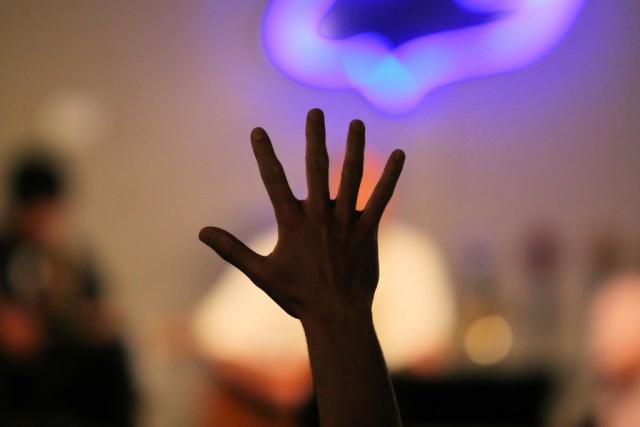PART III
*Months ago, I was visiting a favorite Catholic website of mine on Facebook and was reading a newly released article about our Blessed Virgin Mary. As I was reading various comments of Catholics regarding the article, I noticed one particular person who appears to be trolling under the comment box, unsolicitedly "refuting" different Catholic teachings to any one who would dare to read his comments and take the bait. As I skimmed through other articles of the site, I was baffled to see that same person trolling the comment boxes again under those respective articles, taking on anybody that challenges his varied assertions and accusations, one Catholic at a time that comes his way like in a one-man-versus-an-army martial arts fighting scene. I started to see his trend.
If I recall correctly, he said he used to be Catholic and now belong to some strain of Protestantism (among the roughly 33,000 in existence today) and the Bible alone (Sola Scriptura) is his sole authority. I told him that swapping Bible verses won't get us anywhere (to argue about Mary, Purgatory, Saints and all other Catholic beliefs that Protestants think are a bunch of hooey). Instead I politely ask him if he is willing to answer 3 fundamental questions about our Christian faith. He obliged although seemingly a bit reluctant at first, but answered it nevertheless. Here's one of the questions I raised, his reply and my response back on his reply:
Me: What divine authority has revealed the contents of the Bible?
His Reply: Thank you for asking. As believers, we know that God guided the
formation of the bible, and essentially all of the books of the bible were
already generally accepted as scripture when the bible (the compilation of
scripture, a bookkeeping exercise) was generated. The Catholic church did great
work in the librarian sense, with some protestants later putting chapter and
verse numbers on the bible. All this is practical in order to reference
scripture, but no librarian task had any effect, nor grants any authority over
understanding or teaching scripture. That's misguided, though it is a view held
by a small minority. Remember, scripture is God's word, and came from God, not
from men. It doesn't require men to say it's so in order to be God's word.
My response: Sorry to say I don’t find your version of History
compelling. You said “essentially all of the books of the
bible were already 'generally accepted' as scripture when the bible was
generated” but how do you know which scriptures belong to the Bible in the
first place before it was generally accepted? In the first 4 centuries there
are a lot of scriptures and books floating around, some spurious and false we
now know today, that claims to be divinely inspired as well. How come books
like: the gospel according to the Hebrews, St Paul’s epistle to the Laodiceans,
Epistle of Clement, Shepherd of Hermas, Epistle of Barnabas, Doctrine of the 12
apostles, Apostolic constitutions, the Gospel of James, gospel of Thomas, Acts
of Pilate, Acts of Paul and Thecla and many others, why are these books not in
our Bible today? If the Catholic Church did just bookkeeping and plays merely a
librarian like you said, they played a lousy job compiling and missing out a
lot of books. So how do we know
only 27 New Testament books were accepted as divinely inspired and included in
the Bible? Who said so? We don’t find any verse or chapter in the Bible that
says Hebrews or Corinthians or Revelation, etc., should be included in the
Bible’s table of contents. Scripture itself does not dictate its own
table of contents. Again, there had to be an authoritative church before the Bible was
compiled to determine what books belongs to the Bible.
It is a fact of history
that the Councils of Hippo and of Carthage in 397 AD (all Catholic bishops)
under Pope Damasus I, gathered and determined what books were divinely inspired
and which one weren’t, settled the Canon or collection of new testament
scriptures, decreed that its decision should be sent on to Rome for
confirmation, and promulgated it to the whole world saying this is the Word of
God that all Christians ought to read. This does not sound like a job of a mere
librarian to me. Of course they were guided by the Holy
Spirit in determining those books, Jesus said so in Matt 16:18-19; Luke 10:16. The chapters in the Bible were later put forth by 13th-century
Archbishop of Canterbury Stephen Langton (he does not sound like a Protestant
to me, either), and the verses where put by 16th-century French printer named
Robert Estienne (better known as Stephanus).
So if you accept the authority of
the Bible, then you accept the authority of the Catholic church because the
Catholic church, under the guidance of the Holy Spirit, was the one who "hand-picked" and decided only 27 books were divinely inspired among the rest and
compiled the Bible (Old Testament & New Testament) you and I and the whole world are now reading
today. (The first Protestant, Martin Luther, an ex-Catholic priest, where do you think he got the Bible from)? If you don’t accept the authority of the Church, then you might as well
throw the Bible out in your hands then, because the Bible is a product of
Catholic tradition.



